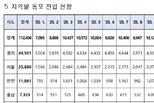Newsnomics AJAY ANGELINA reporter |
Sixty-nine million children - or more than one in five struggling with poverty in the world’s 40 richest countries declared by the UNICEF in a report released on Wednesday, blasting Britain and France for their particularly bad standings.
Poland and Slovenia are among those faring best in tackling child poverty, followed by Latvia and the Republic of Korea. In contrast, some of the richest countries are lagging behind as per UNICEF report.
According to the data published by UNICEF Innocenti - Global Office of Research and Foresight, the most up-to-date, comparable picture of poverty affecting children, finds overall 8 percent decreases in poverty across 40 European Union and Organization for Economic Cooperation and Development (OECD) wealthy countries between 2014 and 2021, there were still over 69 million children living in households earning less than 60 per cent of the average national income by the end of 2021.

“This is equivalent to around 6 million children out of a total child population of 291 million,” said UNICEF Innocenti, the United Nations agency’s research arm.
“The impacts of poverty on children are both persistent and damaging,” said Director of UNICEF Innocenti – Global Office of Research and Foresight, Bo Viktor Nylund.
“For most children this means that they may grow up without enough nutritious food, clothes, school supplies, or a warm place to call home. It prevents the fulfillment of rights and can lead to poor physical and mental health” Bo Viktor added.
According to the report, the consequences of poverty can last a lifetime. The children experiencing poverty have less chance of completing school and earn lower wages as adults. In some countries, a person born in a deprived area is likely to live eight to nine years less than a person born in a wealthy area.
The report also highlights huge inequalities in poverty risks. Across 38 countries with available data, children living in a lone-parent family are over three times as likely to be living in poverty as other children. Children with disabilities and from minority ethnic/racial backgrounds are also at higher-than-average risk.
Since 2012, the biggest setbacks have been seen in some of the richest countries.
Britain saw a 19.6 percent jump in child poverty — or half a million extra children, and France’s rate went up 10.4 percent.
In the United States, the number of poor children has fallen by 6.7 percent more than one child in four still lives in relative poverty, where as 30 percent of African American children and 29 percent of Native American children live below the national poverty line, compared with only one-in-10 non-Hispanic white children.
Denmark, a country with a similar per-capita income shows twice as high poverty rate in 2019~2021.
In the EU, a child with parents of non-EU nationality is 2.4 times more likely to live in poverty.
The UNICEF figure is based on relative poverty, which is around 60 percent of the national median income, often used in developed countries to establish their own poverty levels.
The report called for action to ensure children’s well-being and for political will among the countries surveyed, stressing that a country’s’ wealth did not automatically lift its children out of poverty.










